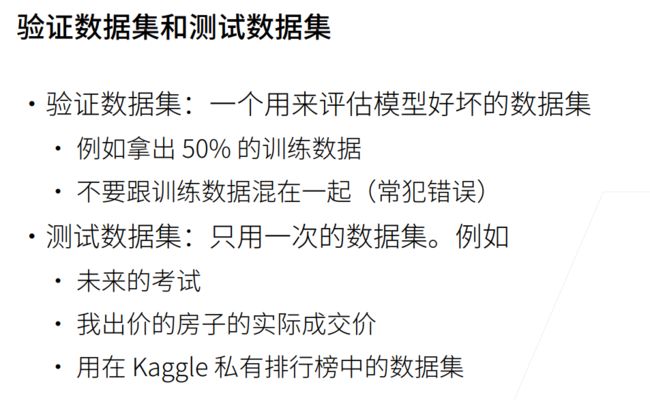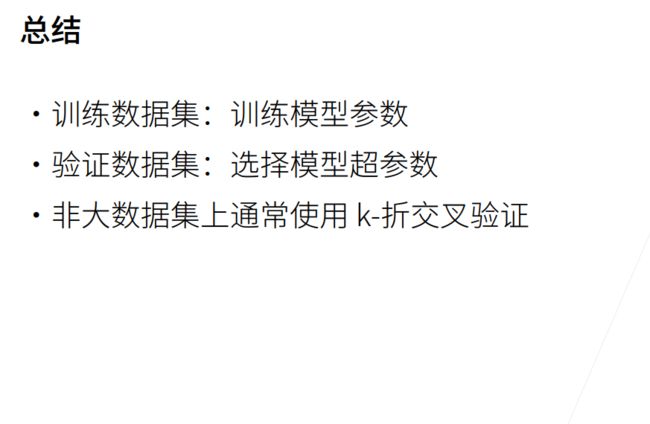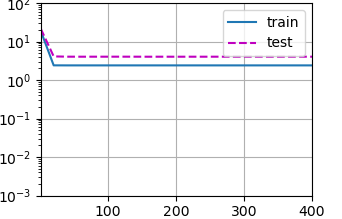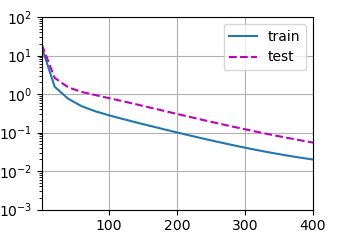李沐《动手学深度学习》课程笔记:11 模型选择 + 过拟合和欠拟合
目录
11 模型选择 + 过拟合和欠拟合
1.模型选择
2.过拟合和欠拟合
3.代码
11 模型选择 + 过拟合和欠拟合
1.模型选择
2.过拟合和欠拟合



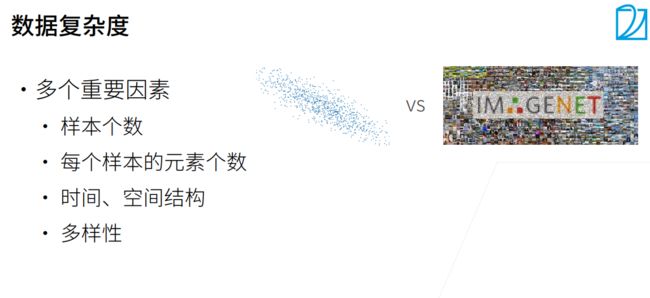
 3.代码
3.代码
# 模型选择、欠拟合和过拟合
# 通过多项式拟合来交互地探索这些概念
import math
import numpy as np
import torch
import matplotlib.pyplot as plt
from torch import nn
from d2l import torch as d2l
import os
os.environ["KMP_DUPLICATE_LIB_OK"] = "TRUE"
max_degree = 20
n_train, n_test = 100, 100
true_w = np.zeros(max_degree)
true_w[0:4] = np.array([5, 1.2, -3.4, 5.6])
features = np.random.normal(size=(n_train + n_test, 1))
np.random.shuffle(features)
poly_features = np.power(features, np.arange(max_degree).reshape(1, -1))
for i in range(max_degree):
poly_features[:, i] /= math.gamma(i + 1)
labels = np.dot(poly_features, true_w)
labels += np.random.normal(scale=0.1, size=labels.shape)
true_w, features, poly_features, labels = [
torch.tensor(x, dtype=torch.float32) for x in [true_w, features, poly_features, labels]
]
print(features[:2], poly_features[:2, :], labels[:2])
# 实现一个函数来评估模型在给定数据集上的损失
def evaluate_loss(net, data_iter, loss):
'''评估给定数据集上模型的损失'''
metric = d2l.Accumulator(2)
for X, y in data_iter:
out = net(X)
y = y.reshape(out.shape)
l = loss(out, y)
metric.add(l.sum(), l.numel())
return metric[0] / metric[1]
# 定义训练函数
def train(train_features, test_features, train_labels, test_labels, num_epochs=400):
loss = nn.MSELoss()
input_shape = train_features.shape[-1]
net = nn.Sequential(nn.Linear(input_shape, 1, bias=False))
batch_size = min(10, train_labels.shape[0])
train_iter = d2l.load_array((train_features, train_labels.reshape(-1, 1)), batch_size)
test_iter = d2l.load_array((test_features, test_labels.reshape(-1, 1)), batch_size, is_train=False)
trainer = torch.optim.SGD(net.parameters(), lr=0.01)
animator = d2l.Animator(xlabel='epoch', ylabel='loss', yscale='log', xlim=[1, num_epochs], ylim=[1e-3, 1e2], legend=['train', 'test'])
for epoch in range(num_epochs):
d2l.train_epoch_ch3(net, train_iter, loss, trainer)
if epoch == 0 or (epoch + 1) % 20 == 0:
animator.add(epoch + 1, (evaluate_loss(net, train_iter, loss), evaluate_loss(net, test_iter, loss)))
print('weight:', net[0].weight.data.numpy())
plt.show()
# 三阶多项式函数拟合(正态)
train(poly_features[:n_train, :4], poly_features[n_train:, :4], labels[:n_train], labels[n_train:])
train(poly_features[:n_train, :2], poly_features[n_train:, :2], labels[:n_train], labels[n_train:])
train(poly_features[:n_train, :], poly_features[n_train:, :], labels[:n_train], labels[n_train:])
tensor([[ 1.2666],
[-0.1539]]) tensor([[ 1.0000e+00, 1.2666e+00, 8.0218e-01, 3.3869e-01, 1.0725e-01,
2.7169e-02, 5.7354e-03, 1.0378e-03, 1.6432e-04, 2.3125e-05,
2.9291e-06, 3.3728e-07, 3.5601e-08, 3.4687e-09, 3.1383e-10,
2.6500e-11, 2.0979e-12, 1.5631e-13, 1.0999e-14, 7.3325e-16],
[ 1.0000e+00, -1.5391e-01, 1.1844e-02, -6.0762e-04, 2.3380e-05,
-7.1966e-07, 1.8460e-08, -4.0589e-10, 7.8087e-12, -1.3354e-13,
2.0552e-15, -2.8756e-17, 3.6882e-19, -4.3665e-21, 4.8002e-23,
-4.9253e-25, 4.7378e-27, -4.2893e-29, 3.6676e-31, -2.9709e-33]]) tensor([5.6214, 4.7863])
weight: [[ 4.9989963 1.1997855 -3.3960633 5.6231313]]
weight: [[3.7553606 2.556017 ]]
weight: [[ 4.9636006 1.4399645 -3.1924648 4.7269516 -0.60285604 0.9733015
-0.01626889 0.23548631 -0.05793007 0.12515599 -0.11259881 0.02957132
-0.03573195 0.04298536 0.17225894 -0.04172051 -0.15639223 0.14563903
0.19347033 0.17333683]]




